This is topic Writing asking for help identifying movie camera in forum 8mm Forum at 8mm Forum.
To visit this topic, use this URL:
https://8mmforum.film-tech.com/cgi-bin/ubb/ultimatebb.cgi?ubb=get_topic;f=1;t=009802
Posted by Julie Checkoway (Member # 4716) on March 02, 2015, 08:04 PM:
I'm a writer on deadline for a book. I am trying to identify a movie camera that was used by one of the individuals about whom I am writing. I'm attaching a photo. The man on the right is holding the camera. His wife is holding the bag for it, I believe. My guess is that it's a kodak cine, but what model? Then my question is: how did it work? As a writer, I want to be able to give the reader a feel for what it was like to have that in hand and operate while trying to do something else at the same time (watch a swim meet). Thanks! Julie Checkoway
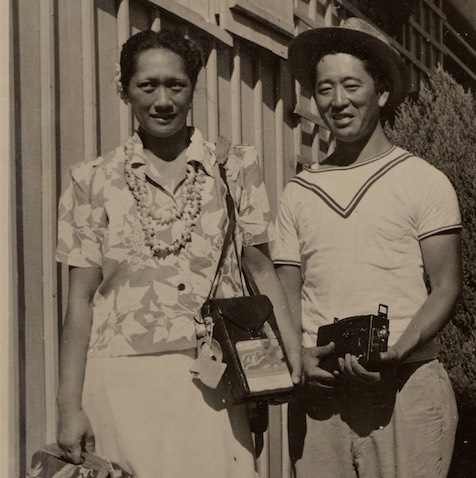
Posted by Clay Smith (Member # 4122) on March 02, 2015, 08:51 PM:
Hi Julie, welcome to the forum.
I think that camera is a 1930's Kodak Model K 16mm movie camera. I have not used one but I'm guessing it was key wound as opposed to battery operated. Someone with more experience with them will hopefully respond. Good luck - Clay i
Posted by Barry Fritz (Member # 1865) on March 02, 2015, 09:07 PM:
I believe it is a Kodak model M. It was operated by winding it up by turning a crank handle on the side. Compared to battery powered camars of today, it was a pain due to the need to stop filming to wind it every so often.
Posted by Julie Checkoway (Member # 4716) on March 02, 2015, 09:24 PM:
Cool. I thought it was either a K or M. So I will have ton of questions regarding what it felt like to use. The book I'm writing is a history of a swim coach who was using one of these pretty early on to film swimmers and analyze their strokes. So I'll probably need to talk to an expert expert who knows these things in and out. Any thoughts? You are so kind!
Posted by Clay Smith (Member # 4122) on March 02, 2015, 09:29 PM:
There are a lot of UK and European members on the forum Julie, hopefully there will be some more responses in 12 hours or so.
Posted by Barry Fritz (Member # 1865) on March 02, 2015, 10:42 PM:
It is most certainly a model M. The model K was a more expensive camera with interchangeable lens. It had a chrome crank handle, and the front framer was chrome and afixd to the lens. The model M was the economy version with a fixed lens and no chrome around the lens or on the crank. You can see both models and more information on them here. Scroll down to page 6 and beyond to see the comparison.
http://www.libraryweb.org/~digitized/tradecats/kodak/Cine_Kodaks_1933.pdf
[ March 03, 2015, 11:20 AM: Message edited by: Barry Fritz ]
Posted by Paul Adsett (Member # 25) on March 03, 2015, 07:15 AM:
Very briefly Julie, using any movie camera of that era was far removed from today's point-and-shoot video cameras. You had to learn a bit about all aspects of shooting with film, such as:
Loading the film, usually on rolls that had to be threaded through the camera, but often contained within drop-in magazines.
Winding up the clockwork motor. You migh get 60 seconds on one wind if you are lucky.
Set the focus ring on the lens for the subject distance from the camera.
Set the light exposure, which depended on the speed(sensitivity) of the film you were using, and the prevailing light conditions, sunny,cloudy,overcast etc.
You shot your roll of film in brief segments of maybe 10 or 20 seconds, and you took a lot of care setting up your shots because film was expensive, and you had to send the film off for processing before you could see how well you had done.
All far removed from the ease of todays digital video. But most of us here would say that the results were usually far better.
Posted by Julie Checkoway (Member # 4716) on March 03, 2015, 03:17 PM:
You guys are great. Did he need a tripod? Was it noisy? Could he use it in rain?
How far away or close did he have to be from, say, guys swimming a race in a pool?
Posted by Bryan Chernick (Member # 1998) on March 03, 2015, 04:42 PM:
A tripod would have been helpful but not required. He would have a steadier shot with a tripod but many amateur movies were filmed without.
Was it noisy? Not too bad, it would make a chattering noise but not very loud.
Could he use it in the rain? It would get ruined if it got wet, maybe with an umbrella to protect it.
How far away or close did he have to be from, say, guys swimming a race in a pool? That depends on the lens but I would say the minimum focus would be less than 6 feet.
Posted by Dominique De Bast (Member # 3798) on March 03, 2015, 06:55 PM:
Julie, I would advise you to try to find someone near to you to own a cine camera that uses spools and has a cranck handle. Nothing will beat the feeling to manipulate it. You don't need to find specifically the model that appears on the picture, it can even be a double 8 camera. The point is to feel the contact with a beautifully designed metallic object, put for example, your eye in the viewfinder and see that if it is not a reflex camera, you will not exactly have the same picture on the film than on the viewfinder (especially if you get closer the subject you're filming). If it was realistic I would even advise you to shoot a film to see by yourself that in most of the cases 30 seconds of filming (what the spring allows you) is more than enough as a scene usually needs 5 to 15 seconds (scènes became longer with the sound). Not knowing immediately what the result is is also a reality of filming on stock. Watching some old home movies may also help you to feel things.
Posted by Bill Shenette (Member # 4561) on March 04, 2015, 05:03 AM:
It's what the other member said a
Antique 1920's Cine Kodak Model B 16mm Cine Movie Camera
Posted by Julie Checkoway (Member # 4716) on March 04, 2015, 08:26 AM:
So, just to clarify.....its a 1930s cine M, yes? It makes a HUGE difference if this is from the 20s. Can folks confirm the 1930s? M? Thanks so much. Julie
Posted by Colin Auty (Member # 231) on March 04, 2015, 08:56 AM:
Hi Julie
the camera in the photo is a 1931 16mm Cine- Kodak Model BB Junior(1:3,5)with the Kodak Anastigmat 1:1,9/25mm lens -hope this helps.
PM me with your e-mail adress and I'll send you a picture of it.
Regards
Colin
Posted by Julie Checkoway (Member # 4716) on March 04, 2015, 09:21 AM:
Hey, folks--just to clarify. I am writing a book of history, so I have to get this one 100% accurate. Should I be providing a clearer image for you to see? I would need exact year, exact model, as the camera is central to the story I am telling. This is a book for publication to a general audience, November pub date. I can't get this wrong. Help? ![[Smile]](smile.gif)
Posted by Dominique De Bast (Member # 3798) on March 04, 2015, 09:27 AM:
Julie, if the camera is the centre of the story in an historic book, I modify my preceeding message. It's a must for you to hold one (or one alike) in your hands and to manipulate it for a while. A old cine amateur book may helm you to understand some technical aspects of filming with such a camera.
Posted by Julie Checkoway (Member # 4716) on March 04, 2015, 11:25 AM:
Dominic,
Totally agree. But first have to identify the model of the darn thing and the year.
for those who would like to see an image in full here's a dropbox link.
Most grateful. Once I know which camera/year it is, then I can also consult the manual. I have manuals from 1933-47, thanks to a kind poster here.
https://www.dropbox.com/s/dr95shk2qaaleyg/1941%20high%20point%20PIC%20OF%20COACH%20ADN%20MISSUS%20copy.tif?dl=0
Here is the link to a page someone has suggested that seems to be the model BB. Thoughts?
www.valleystream.co uk/alexander-archive-3.htm
Please only weigh in if you are absolutely certain. I am under deadline. ![[Smile]](smile.gif) J
J
Posted by Bryan Chernick (Member # 1998) on March 04, 2015, 11:41 AM:
Julie, I would agree with Barry, It looks like the Kodak Model M.
This is a Kodak Model BB junior, note the lack of crank in the top right side of the camera. Instead it has a winding key in the lower right side.
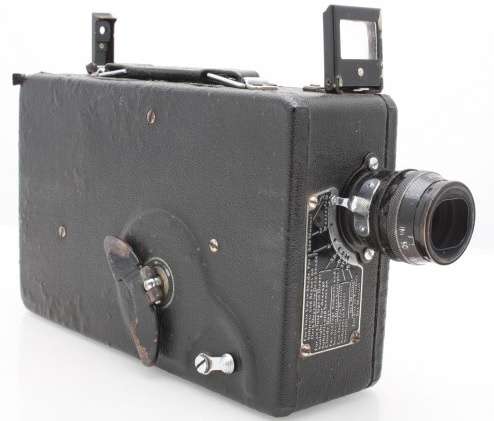
This is the Model M, Note the winding crank in the top right side of the camera. The crank is black, not chrome like the model K as seen in the link Barry provided above.
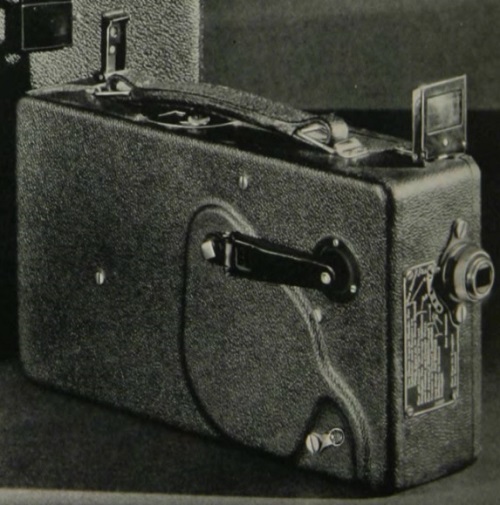
This is the camera in question, you can see the black crank in the top right side of the camera.
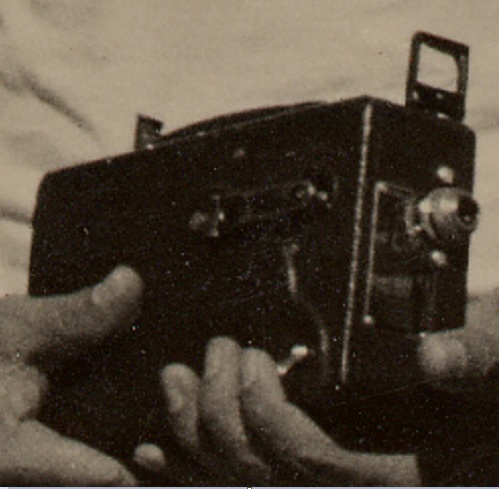
Posted by Julie Checkoway (Member # 4716) on March 04, 2015, 11:46 AM:
Nota bene: Acknowledgment in book to the person or persons most helpful and accurate.....
![[Smile]](smile.gif)
![[Smile]](smile.gif)
Posted by Paul Adsett (Member # 25) on March 04, 2015, 04:04 PM:
Julie, whoever it was taking these movies with that Cine-Kodak camera, they would also have needed a projector to show it. Do you need information on likely projectors that they would have used for this time period?
Posted by Barry Fritz (Member # 1865) on March 04, 2015, 10:20 PM:
Thanks Bryan. Your photos prove what I said. It is without question a model M.
Posted by Julie Checkoway (Member # 4716) on March 06, 2015, 10:52 AM:
Nice job, folks! I think the higher res picture helped all. And yes, I do think it would be helpful to know what it's like to operate the projector. I have, via Barry an excellent manual of choices, but I do not know which the individual used. I would like to know how loud it was, how hot it would get, how long one could run it without overheating it. He used to watch movies in a small plantation house at night, for hours. With thanks, Julie
Posted by Paul Adsett (Member # 25) on March 06, 2015, 11:35 AM:
Well, as he had a Cine-Kodak camera, chances are he had a Kodascope 16mm silent projector. The 1930's models were the K,l,E, and G. These machines typically had lamps ranging from 300 watts to 750 watts, so they put out a lot of heat, and would certainly help warm up a room on a cold night. There was no limitation on how long they could be run.
Posted by Julie Checkoway (Member # 4716) on March 06, 2015, 12:35 PM:
How loud would they have been? His wife was trying to sleep in the same room! ![[Smile]](smile.gif)
Posted by Paul Adsett (Member # 25) on March 06, 2015, 04:00 PM:
About as loud as a sewing machine. If his films were typical of most people's home movies, his wife would have no trouble sleeping! ![[Big Grin]](biggrin.gif)
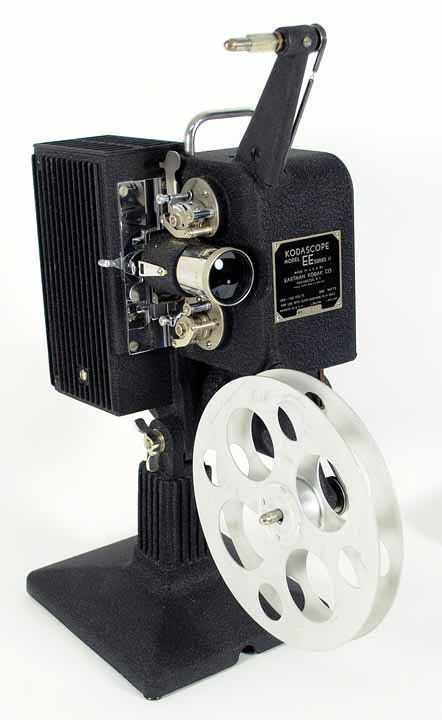
[ March 06, 2015, 05:16 PM: Message edited by: Paul Adsett ]
Posted by Barry Fritz (Member # 1865) on March 06, 2015, 11:02 PM:
Julie, even though the lamps put out a lot of heat, the projectors were made with internal fans that blew air across/over the lamp and kept it from overheating. Without some sort of indication what brand of projector he used, we could only speculate as to what he used. I agree with Paul that the chances are good that it was a Kodak model.
Visit www.film-tech.com for free equipment manual downloads. Copyright 2003-2019 Film-Tech Cinema Systems LLC

UBB.classicTM
6.3.1.2

![[Smile]](smile.gif)
![[Smile]](smile.gif) J
J



![[Smile]](smile.gif)
![[Smile]](smile.gif)
![[Smile]](smile.gif)
![[Big Grin]](biggrin.gif)
